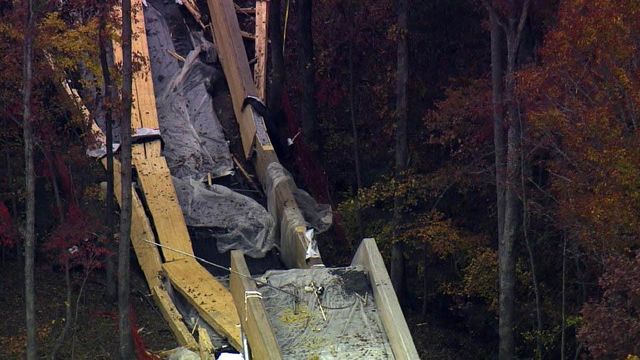Investigators say design flaws led to fatal Wake Tech bridge collapse
Investigators with the North Carolina Department of Labor say design flaws within support structures led to the collapse of a pedestrian bridge on Wake Technical Community College's Northern Campus.
Posted — UpdatedOne construction worker was killed and four others were injured on Nov. 13, 2014, when the 200-foot-long bridge that cuts through a wooded area on campus gave way. Investigators said design flaws with several notches in the glulam girders, which are supporting structures, caused the collapse.
Occupational Safety and Health Division officials said that Stewart Engineering Inc., the firm hired to prepare drawings for the bridge, should have been aware of the flaws. Despite that, the company has not been cited due to a "lack of any applicable occupational safety and health standards or labor laws/administrative codes that address bridge design."
Stewart has worked on major projects across our state, including Terminal 2 at Raleigh-Durham International Airport, the Campbell University's Norman Adrian Wiggins School of Law and the James B. Hunt Jr. Library on North Carolina State University's Centennial Campus. Company officials declined to comment on the state's investigation.
"Stewart cooperated fully with the OSHA investigation and is committed to continue in that regard with other investigations," the company said in a statement. "Because of ongoing investigations, it is not appropriate for us to discuss this matter publicly at this time. We continue to assist and work earnestly with all the involved parties to move the process forward."
Although a full investigative report hasn't been released, Department of Labor officials said in letters sent this week to Stewart, general contractor Skanska USA and subcontractor J.O. Concrete Services Inc. that the findings of the state investigation have been referred to the North Carolina Board of Examiners for Engineers and Surveyors.
The Board of Examiners, which is the licensing board for engineers in the state, will perform its own investigation over the coming months and then hold a disciplinary hearing, board executive director Andrew Ritter said.
If the board finds there was a technical violation, the punishment could range from a reprimand to a $5,000 fine to suspension or revocation of an engineering license, Ritter said.
Stewart Engineering has never had any disciplinary action taken against it, he said.
Injured man still unable to work
A large group of construction workers were on the bridge pouring its concrete deck when it collapsed, and 42-year-old Jose Luis Rosales-Nava, a father of three, was killed after he was trapped under a board. Rosales-Nava and those injured worked for J.O. Concrete.
Omar Lopez, Rosales-Nava's brother-in-law, suffered back and head injuries in the accident and said he hasn't worked since then.
"I’m unable to do things I could do before," Lopez said. "I’m unable to return to work, but trying as hard as I can to walk and get better."
The crew was almost finished spreading cement on a section of the bridge when they heard a crashing sound and fell, he said.
"I’m devastated by what happened to (Rosales-Nava) and the pain my sister has suffered," he said. "I feel satisfied in knowing none of the responsibility was mine or my brother-in-law, who rests in peace."
Lopez' attorney, Robert Zaytoun, said his firm is conducting its own investigation into the collapse and said it's likely the design flaw was missed by many people.
"In a multimillion-dollar engineering project like this, the final designs don’t exist in a vaccum," Zaytoun said. "They pass through many educated hands and across many eyes that are qualified to have caught what we think was a fundamental error."
A second bridge under construction on campus collapsed a day later, but no injuries were reported in that incident. The two bridges were part of a campus expansion project on the Louisburg Road campus paid for by bonds approved by voters in 2012.
Work on both bridges halted after the first collapse, and no work has been done in the past six months. Wake Tech officials said they don't know when the project might resume.
• Credits
Copyright 2024 by Capitol Broadcasting Company. All rights reserved. This material may not be published, broadcast, rewritten or redistributed.






